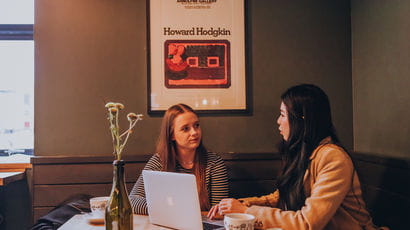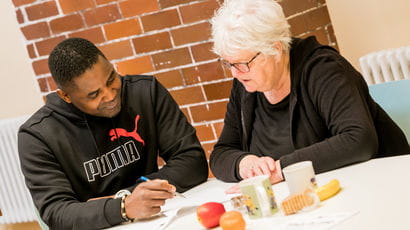Liverpool mental health partnership
A case study on the Liverpool Hub.
The Liverpool Hub was a partnership between the University of Liverpool, Liverpool John Moores University, Liverpool Guild of Students, and Mersey Care NHS Foundation Trust.
Services established by the Liverpool Hub
U-COPE Self Harm Clinical Service
U-COPE is a new care pathway focussed specifically on students who self-harm, developed with Mersey Care Trust. U-COPE is a Psychodynamic Interpersonal Therapy (PIT) which aims to support patients experiencing self-harming behaviours and offers a six-week long intervention with opportunities for follow-up care. Between September 2020 and October 2021, 168 students have been referred into the U-COPE service: 74 from the University of Liverpool (UoL), 51 from Liverpool John Moores University (LJMU), 33 from GPs and 10 from NHS services.
Student Liaison Service
The Student Liaison Service grew out of the experience of developing the U-COPE service. Early approaches to pathway improvement highlighted that due to the complexity of the entry points into services, existing gaps in provision and frequent service redesign within the NHS the desired outcomes were not likely to be achieved, nor be sustainable using the proposed pathway improvement model. In parallel, increased demand from Mersey Care Trust for project support for students, and by university staff seeking to support students to access Mersey Care services indicated the value of a liaison service as a solution.
This pilot activity is delivered by project clinical staff who act as an interface between NHS and Higher Education Institution (HEI) professionals and services. The service is informed of a student in distress, or requiring follow-up, by urgent care services and then contacts the student to offer a brief intervention and to signpost or refer to relevant services. To date (December 2021) over 370 students from five Liverpool HEIs have been contacted by the Liaison Service. This has led to NHS services improving their identification of student users, and those students receiving follow-up in a timely manner, offering an extra level of support to this high-risk population. The service also attends multidisciplinary team meetings at each university where students with complex needs and or presenting to multiple services are discussed and care pathways agreed.
Student co-production
It was important that, as the project aimed to improve student access to mental health services, their voice was prevalent throughout the project planning, implementation and evaluation. It was also vital that students were adequately represented on project working and governance groups. Members of both UoL and LJMU student population representatives were invited to sit on the groups and provide feedback throughout the project. We also took advice from Student Minds on student engagement strategies and incorporated student engagement and co-production throughout the project again some of this work was limited by the pandemic when opportunities to meet in person were reduced.
- Student Mental Health Survey: an annual survey conducted over UoL and LJMU which researched the student experience and prevalence of mental health conditions and their experience of support and services available to them.
- Focus groups and interviews with students who have lived experience: sessions were held with students from both HEIs to gain comment on their views of accessing services. Students identified that they had difficulties understanding what was available to them and what they could access when and once in the system navigating it was difficult and too complex
- Focus groups with targeted groups such as Chinese students, HEI service users, etc. Sessions informed project design and development of both clinical services and wider engagement activities by the project and wider HEIs.
- Year in Industry Student: second year student employed by the project to take forward communications and interactions with students. Placement lasted 10 months.
- Content Creators: students recruited from both institutions involved in digital content creation to promote student wellbeing and project services. This group has supported the Zero Suicide Alliance to record a 16-24 focused training module. They have also designed a Wellbeing Wall, producing content, social media accounts and links to service websites as part of a project funded by Santander Universities.
Impact
The combination of the U-COPE and Liaison Service has become known as the Liverpool Model and is continuing to be developed and evaluated to secure sustainable funding for Liverpool.
The development and testing of the Liverpool Model has improved student access to appropriate care pathways. Although there are still multiple referral routes into NHS and university services, the Liaison Service enables students to navigate these services more effectively. Multidisciplinary Team meetings attended by the service ensure enhanced support for students with complex needs and effective use of university and NHS resources to support students. The development of key roles and responsibilities for the liaison service also provides:
- improved risk management of students
- enhanced communication between organisations
- joined-up care approaches where appropriate
- opportunities to begin to collate appropriate data sets to measure live need of the student population and evidence impact.
Student Mental Health Partnerships Project
UWE Bristol led a partnership across the Higher Education sector to improve care for students in need of mental health support through the development and evaluation of local partnerships between universities, the NHS and Students’ Unions, connected via a National Learning Collaborative.
Student Mental Health Partnerships ProjectYou may also be interested in

Greater Manchester mental health partnership
A case study on the Greater Manchester Universities Student Mental Health Service pilot.

North London mental health partnership
A case study on the North London mental health partnership.

Sheffield Hub mental health partnership
A case study on the Sheffield mental health partnership.

Bristol Hub mental health partnership
A case study on the Bristol mental health partnership.
